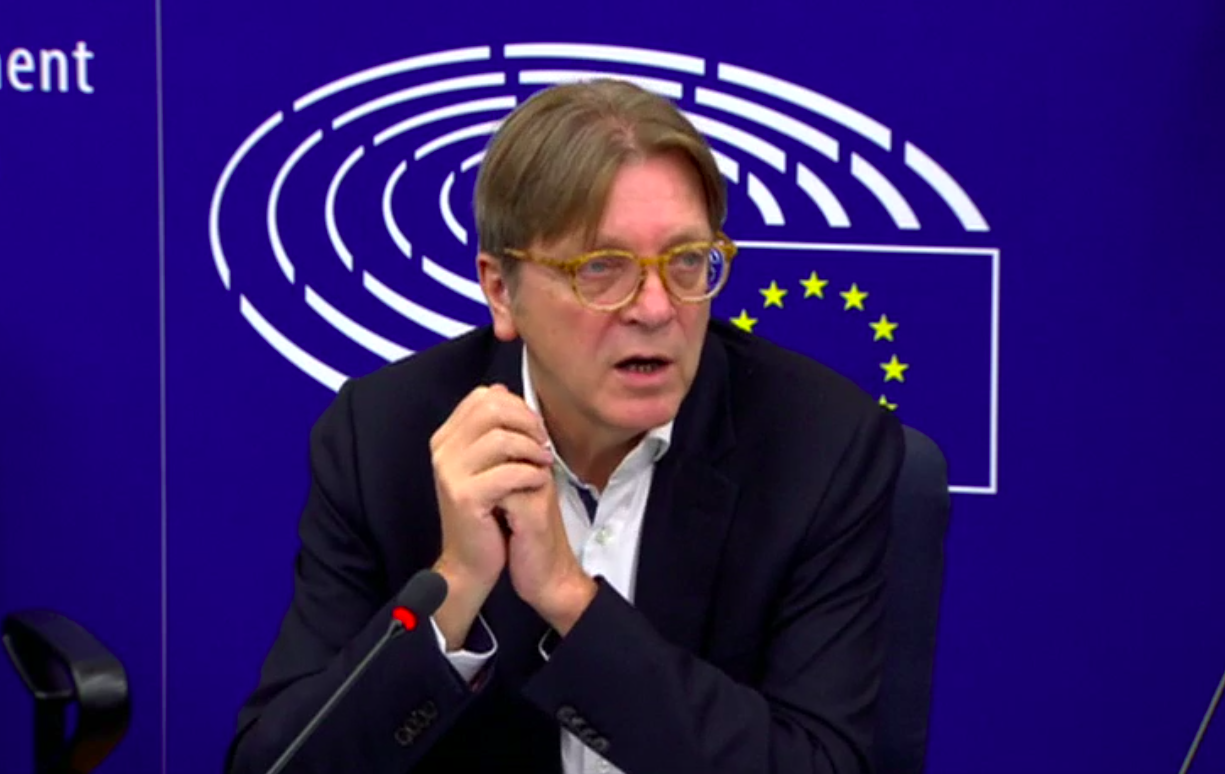Brexit: European Parliament chief condemns 'unacceptable' David Davis remarks as backlash grows
Brexit Secretary ‘undermining good faith’ in negotiations, a furious Guy Verhofstadt says
Your support helps us to tell the story
From reproductive rights to climate change to Big Tech, The Independent is on the ground when the story is developing. Whether it's investigating the financials of Elon Musk's pro-Trump PAC or producing our latest documentary, 'The A Word', which shines a light on the American women fighting for reproductive rights, we know how important it is to parse out the facts from the messaging.
At such a critical moment in US history, we need reporters on the ground. Your donation allows us to keep sending journalists to speak to both sides of the story.
The Independent is trusted by Americans across the entire political spectrum. And unlike many other quality news outlets, we choose not to lock Americans out of our reporting and analysis with paywalls. We believe quality journalism should be available to everyone, paid for by those who can afford it.
Your support makes all the difference.The European Parliament’s Brexit coordinator has accused David Davis of “undermining trust” with “unacceptable” comments that implied last week’s breakthrough deal was not legally binding.
Guy Verhofstadt lashed out as he revealed MEPs would toughen up their red lines before agreeing that the negotiations can move on to a future trade deal – a development Britain badly wants.
“Remarks by David Davis that phase one deal last week not binding were unhelpful & undermines trust. EP text will now reflect this & insist agreement translated into legal text ASAP,” Mr Verhofstadt tweeted.
Calling the comments “unacceptable”, he added: “It’s time the UK government restores trust. These amendments will further toughen up our resolution.”
An amendment to the parliament’s Brexit motion and backed by the leaders of all the non-eurosceptic political groups says negotiations “can only progress during the second phase if the UK government also fully respects the commitments it made”.
A second amendment, also backed cross-party by all the non-eurosceptic groups, says “comments made like those by David Davis calling the outcome of phase I of the negotiations a mere ‘statement of intent’, risk to undermine the good faith that has been built during the negotiations”.
In contrast to Mr Davis, Irish prime minister Leo Varadkar has however publicly state that the deal is in fact “bulletproof”.
Mr Davis “clarified” his comments the following day, claiming that when he said the deal was a “statement of intent” he actually meant the deal was “more than just legally enforceable”.
The European Parliament motions are supported by Mr Verhofstadt, leader of the liberal group and the Parliament’s Brexit coordinator – as well as Manfred Weber, the leader of the European People’s Party group, and Gianni Pittella, the socialist group leader.
Gabriele Zimmer, leader of the left group, Philippe Lamberts and Ska Keller, leaders of the Green group, and Danuta Maria Hubner, chair of the Parliament’s constitutional affairs committee, have also put their names to it.
Mr Verhofstadt branded Mr Davis’s remarks “unacceptable” and said the amendments would “further toughen-up our resolution” laying out the Parliament’s red lines. The European Parliament is not directly involved in talks but has a veto on any final deal and is in regular consultation with the European Commission, which is meeting with the UK directly.
It was reported this morning that the European Council, the EU member state’s leaders acting collectively, has also toughed up its draft text, set to be agreed by heads of state and governments at a Brussels summit on Thursday and Friday.
The new draft includes a stipulation that the next phase of talks can only begin if the UK “quickly” moves to implement the Brexit agreement into law and if it becomes a legally binding treaty.
Aside from Mr Davis, Theresa May also added to the confusion over Britain’s will to stand by the deal on Monday in the House of Commons.
When it was pointed out that paragraph 96 of the deal says the UK will pay the divorce bill even if no full trade deal is completed but only a framework, Ms May replied: “No, that is not my understanding of the joint progress report or the position that we will be in. It is very clear at the beginning of the joint progress report that this is a set of proposals that have been put forward in the context of negotiating that final agreement.”

The agreement, however, says the UK agrees to the text “on the condition of an overall agreement under Article 50 on the UK’s withdrawal, taking into account the framework for the future relationship, including an agreement as early as possible in 2018 on transitional arrangements”.
Mr Davis had told the BBC at the weekend: “This was a statement of intent more than anything else. Much more a statement of intent than it was a legally enforceable thing.”
But he later told LBC: “What I actually said yesterday, in terms, was we want to protect the peace process, we want to protect Ireland from the impact of Brexit for them. And I said this was a statement of intent which was much more than just legally enforceable.”

Join our commenting forum
Join thought-provoking conversations, follow other Independent readers and see their replies
Comments